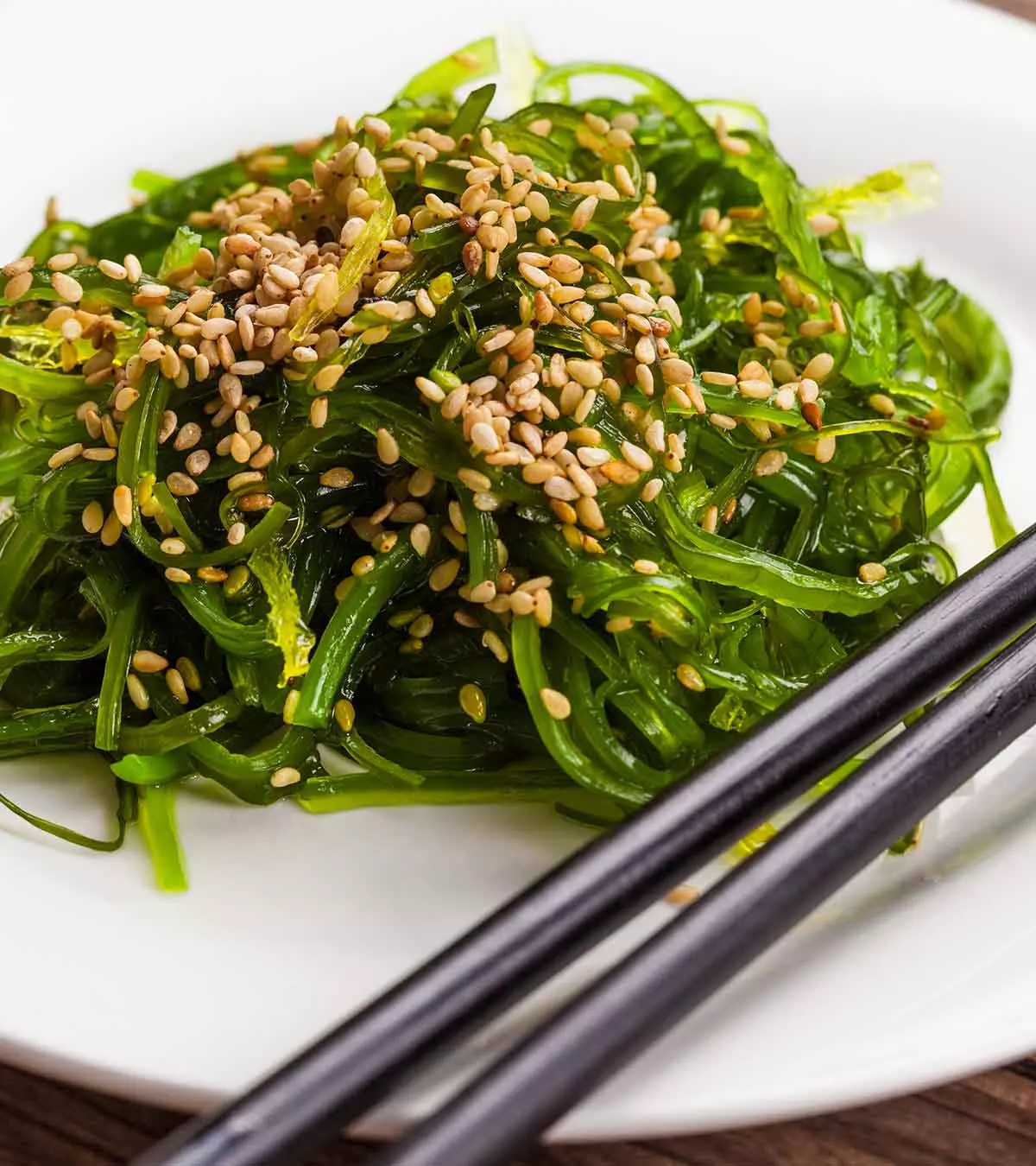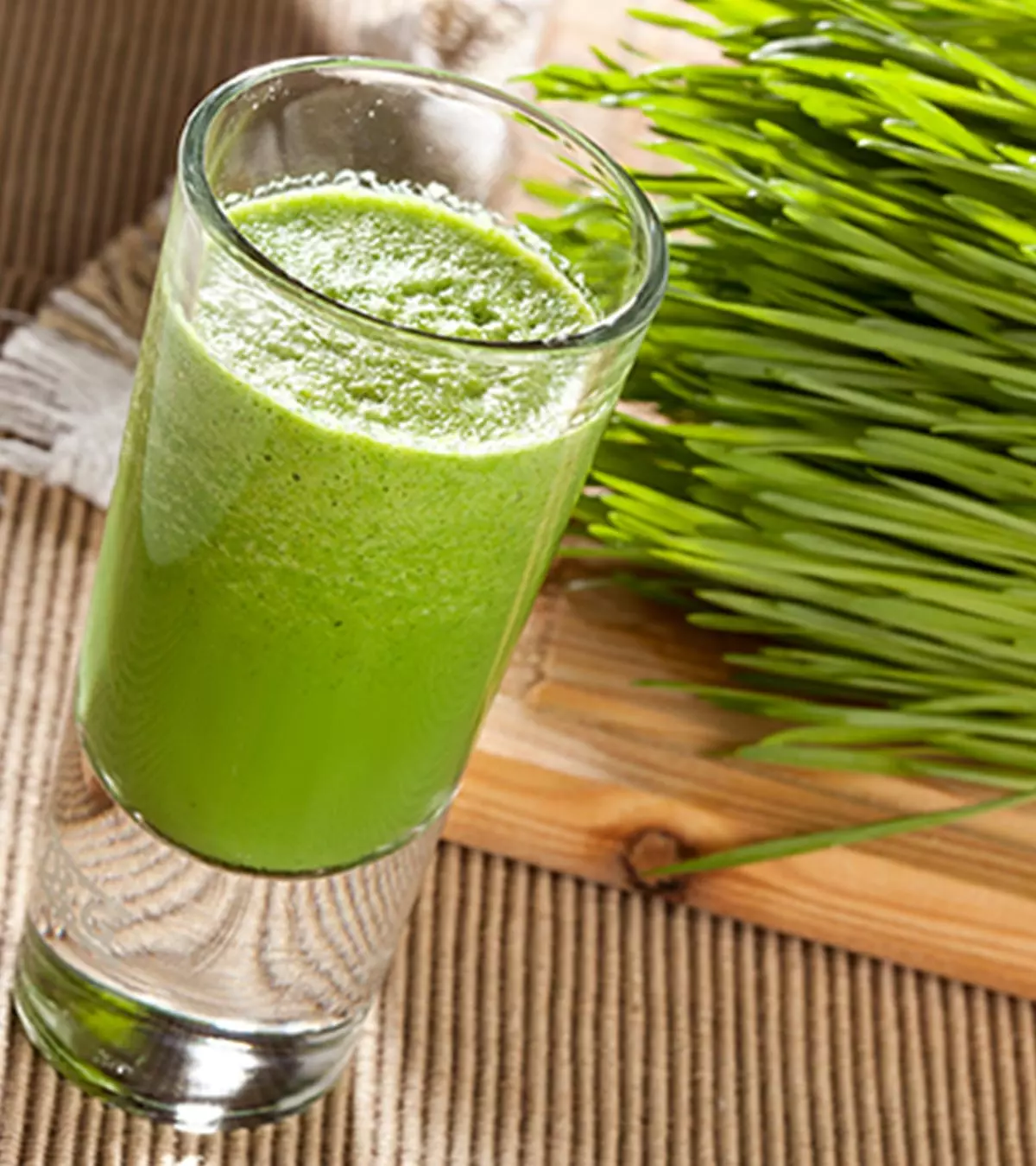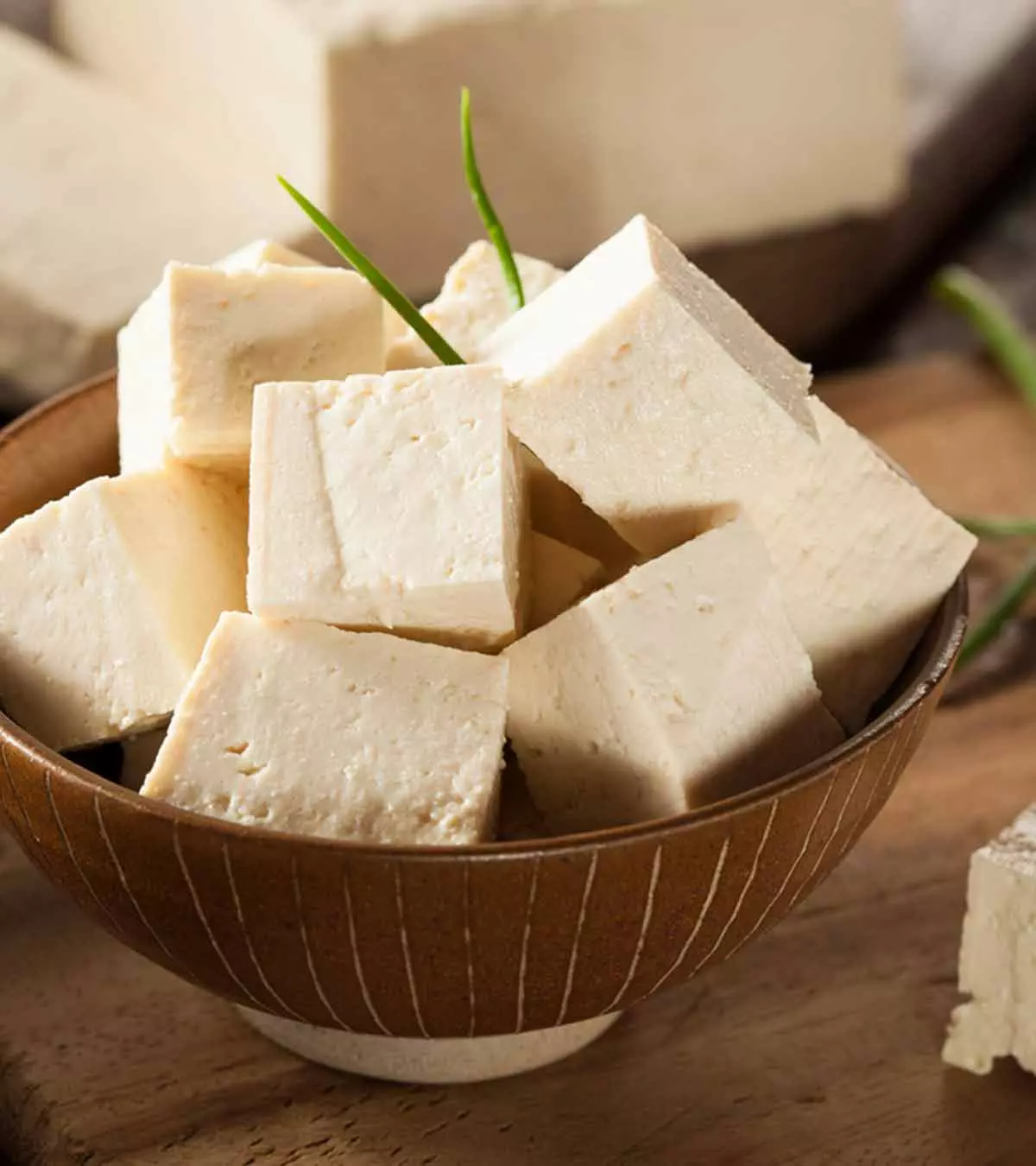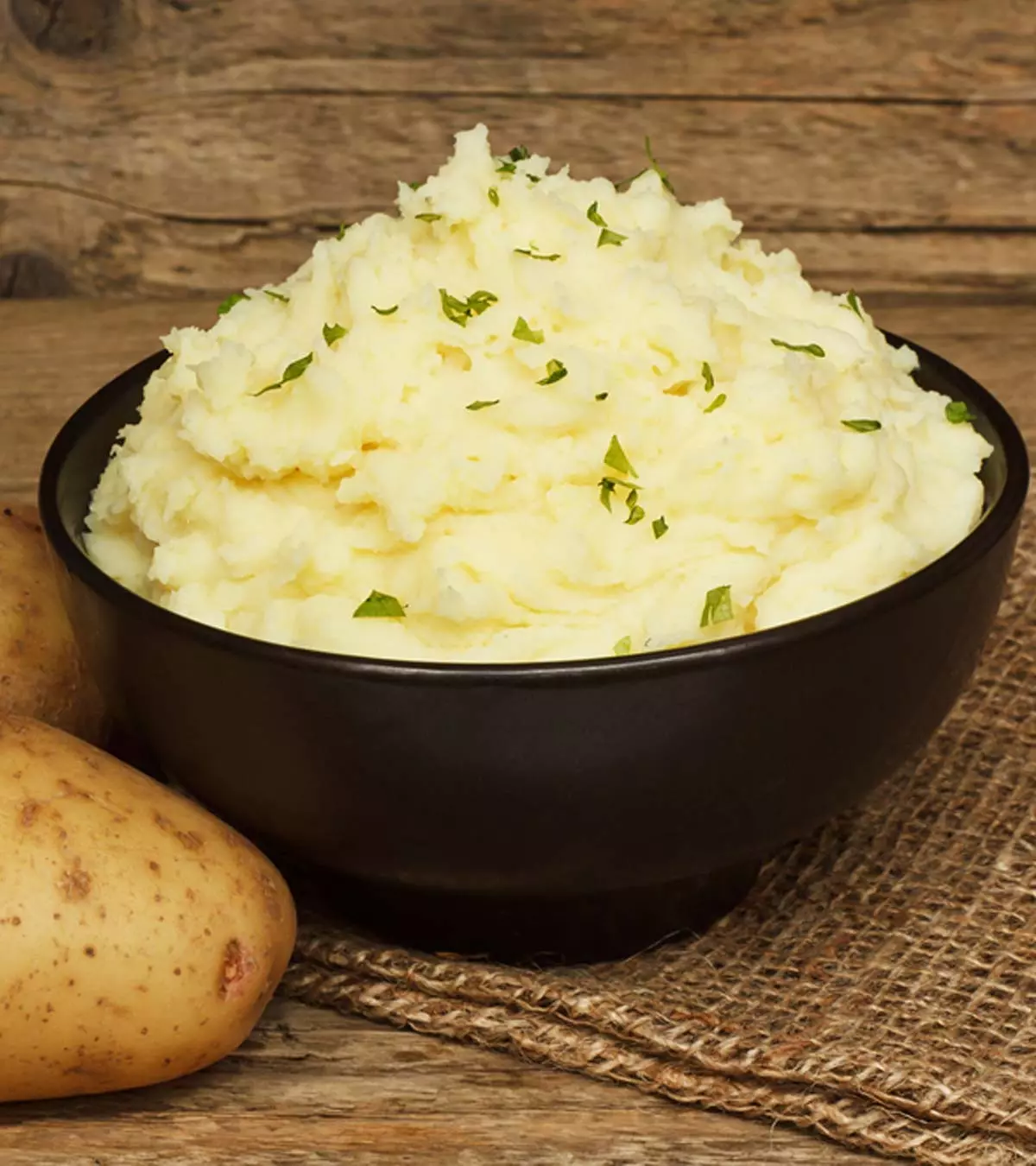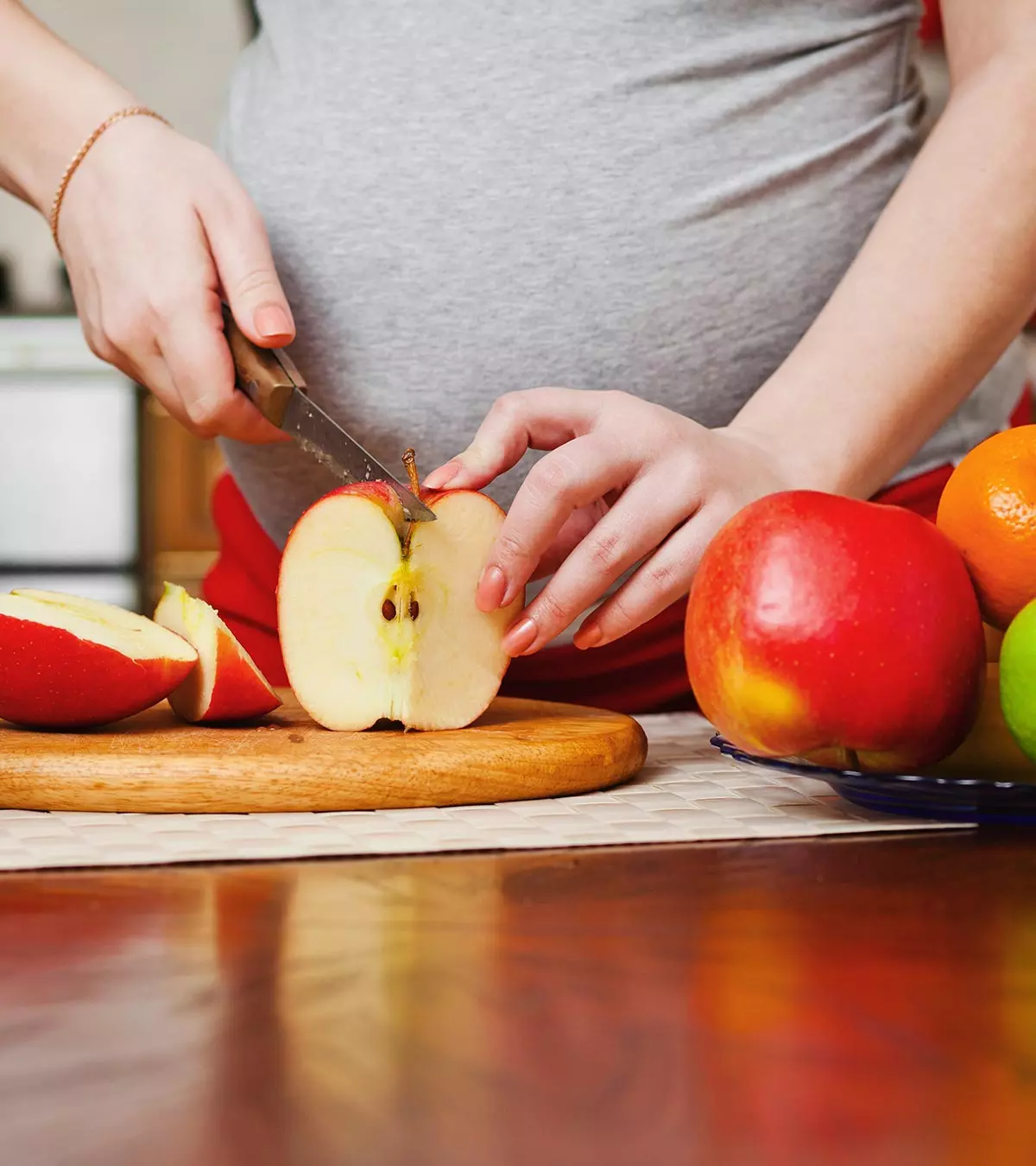
Eating a well-balanced diet during pregnancy helps you stay healthy and fit. It is known how essential it is to eat vegetables and fruits during pregnancy to get the necessary minerals and vitamins. One such fruit is apples. Consuming apples during pregnancy has many health benefits. So, read on to know more about the safety, health benefits, nutritional value, possible side effects, and interesting ways to include apples in your diet during the prenatal period.
Key Pointers
- Apples are a good source of fiber, vitamins, and minerals, but should be consumed fresh and in moderation during pregnancy.
- Apples can help boost immunity, aid digestion, and prevent oxidative cell damage and anemia in pregnant women.
- Apples can be incorporated into a pregnancy diet in various forms, including juice, chips, sauces, and tea.
- However, excessive consumption of apples during pregnancy may negatively impact metabolism and lead to weight gain.
Is It Safe To Eat Apples During Pregnancy?
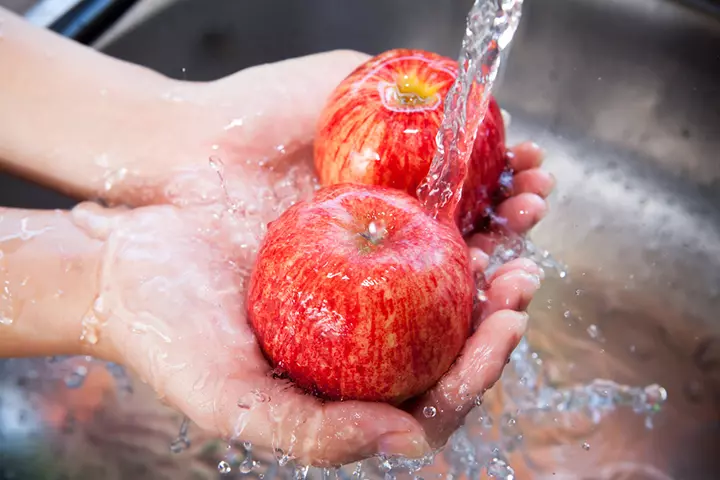
Image: Shutterstock
Yes, apples are safe to eat when you are pregnant (1). They are highly nutritious and rich in antioxidants, phytonutrientsiNatural chemicals and nutrients obtained from plants. , flavonoids, and dietary fiber. However, wash the fruit thoroughly before you eat to eliminate any pesticide residues on them. Also, avoid eating seeds of an apple, because they contain cyanide that is harmful to the body (2). Also, avoid eating apples at night as it may cause indigestion.
 Did you know?
Did you know?What Are The Health Benefits Of Eating Apples During Pregnancy?
Eating apples during pregnancy can help:
1. Prevent anemia
Apples are rich in iron and help boost the hemoglobin level in the blood and prevent anemiaiA condition in which a person does not have enough healthy red blood cells to carry oxygen to the tissues. (3)
. The risk of anemia is higher during pregnancy, and if neglected, it could lead to preterm labor and low birth weight in babies.
2. Improve immunity

Image: IStock
100 gram of apple contains 4.6mg of vitamin C, which on regular intake aids the immune system in building resistance and wards off infections and diseases (4).
3. Prevent free radicals
Flavonoids and phytochemicals are powerful antioxidants in apples that combat free radicals from the body. Free radicals otherwise can lead to oxidative damage to cells, DNA, and their functioning ability (5).
4. Boost energy instantly
Simple sugars including glucose, fructose, and sucrose present in apples provide an immediate energy boost. Having an apple handy can be helpful when you feel hungry or have low blood sugar issues (6).
5. Protect your heart
Daily consumption of apples reduces bad cholesterol levels, plaque formation, and inflammation of artery walls (7).
6. Prevent cancer
Regular consumption of apples reduces the risk of lung, colorectaliRelated to the colon and rectum. , digestive tract, and breast cancers
. The phytochemical compounds in the fruit are known to possess anti-cancer properties (8).
7. Prevent respiratory issues
Eating apples during pregnancy can lower the risk of developing childhood asthma and allergic diseases. The antioxidants present in apples help strengthen your lungs (9).
8. Manage morning sickness and nausea
Consuming apples may not treat pregnancy nausea, but small amounts of apple juice and bland foods like applesauce are often recommended to manage morning sickness (10). Apples are easy to digest and contain natural sugars that can be a quick energy source. Besides, they contain pectin, a soluble fiber that can help absorb excess stomach acid and may be beneficial in cases where nausea is triggered by indigestion. A randomized controlled trial involving 72 expecting women found that sweet apples (Fuji variety) had the highest agreeability and lowest nausea score compared to other foods such as watermelon, cream crackers, and white bread (11). Hence, including apples in the prenatal diet can be a beneficial choice for would-be mothers.
9. Aid in digestion

Image: Shutterstock
Apples are fiber-rich fruits that help in proper digestion also, it contains pectins, which help to bulk up stool and promote smooth bowel movements (12). It is also helpful to treat diarrhea or constipation.
Mary Sabat, a nutritionist and certified personal trainer from Alpharetta, Georgia, says, “Eating apples helps regulate blood sugar levels, which can reduce hunger and cravings. However, if a pregnant woman eats just an apple with no other foods and is a type 2 diabetic or gestational diabetic, an apple may stimulate hunger by raising insulin levels. An apple contains a good amount of sugar, so the rise in blood sugar for a diabetic could lead to hunger shortly, as too much insulin drops the sugar levels.”
 Research finds
Research findsNext, we tell you about the nutritional values of this fruit.
Nutritional Value Of Apples
100 grams of raw apple (including peel) contains (13):
| NUTRIENT | AMOUNT |
|---|---|
| Calories | 52kcal |
| Water | 85.56g |
| Carbohydrates | 13.81g |
| Sugars | 10.39g |
| Protein | 0.26g |
| Fiber | 2.4g |
| Fat | 0.17g |
| Vitamins | |
| Thiamin (Vitamin B1) | 0.017mg |
| Riboflavin (Vitamin B2) | 0.026mg |
| Niacin (Vitamin B3) | 0.091mg |
| Pyridoxine (Vitamin B6) | 0.041mg |
| Folate (Vitamin B9) | 3mcg |
| Ascorbic acid (Vitamin C) | 4.6mg |
| Retinol (Vitamin A) | 54IU |
| Alpha-tocopherol (Vitamin E) | 0.18mg |
| Phylloquinone (Vitamin K) | 2.2mcg |
| Electrolytes | |
| Potassium | 107mg |
| Sodium | 1mg |
| Minerals | |
| Calcium | 6mg |
| Iron | 0.12mg |
| Phosphorus | 11mg |
| Magnesium | 5mg |
| Zinc | 0.04mg |
| Lipids | |
| Total saturated fatty acids | 0.028g |
| Total monounsaturated fatty acids | 0.007g |
| Total polyunsaturated fatty acids | 0.051g |
g=grams; mg=milligrams; IU=International Units
Are Green Apples As Good As Red Apples?
Consuming delicious green apples during pregnancy can serve as a really good source of nutrition. They are as good and healthy as red apples, albeit with a slight variance. They have a thicker peel and are crispier and sour. They are rich in soluble fiber that helps reduce cholesterol levels, manage weight, and regulate blood sugar levels (14).
While eating a reasonable amount of apples is good for both the mother and the baby, overindulging in it can be a bad idea.
 Quick fact
Quick factSide Effects Of Excess Apple Consumption During Pregnancy
Be mindful of the number of apples in your diet, for overconsumption of the fruit can cause the following complications.
- Affects metabolism: Overconsumption of apples increases carbohydrate intake, which in turn increases sugar levels, slows down metabolism and prevents your body from burning fat.
- Weight issues: Consuming too many apples will increase the calorie intake, thus leading to weight management issues later during pregnancy.
The daily recommended dosage of apples for pregnant women is two to four servings a day, of which one serving equals one medium-sized whole apple (15).
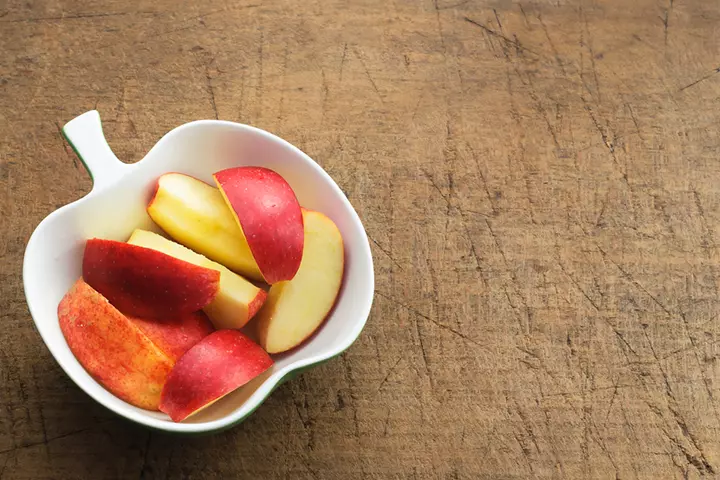
Image: Shutterstock
Ways To Include Apples In Your Pregnancy Diet
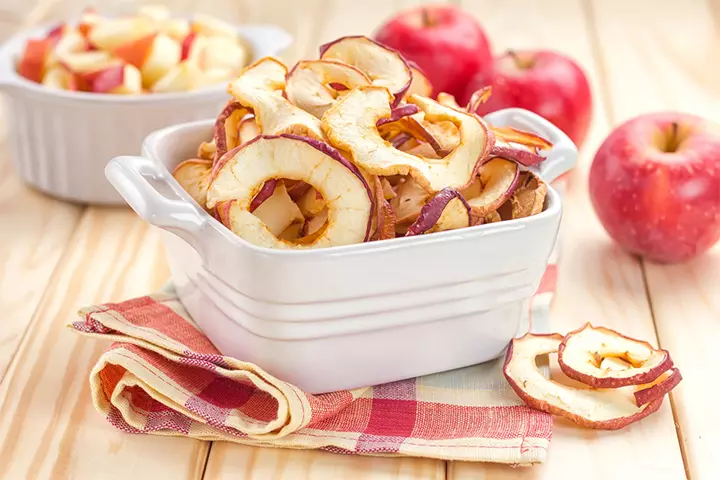
Image: Shutterstock
Eating fresh fruits just as they are can be boring sometimes. So you may try different kinds of mouth-watering apple recipes to keep yourself happy and healthy. Here are a few.
- Fresh apple juice twice a day will help satisfy your thirst. You might also mix other fruits or vegetables such as a carrot or beetroot to make a mocktailiA non-alcoholic drink made by mixing juices and herbs with soda or water. .
- Combine brown sugar and honey with apples and bake them until tender and golden brown.
- Dried apples or crispy apple chips are also good snacking options.
- Homemade applesauce tastes good with pancakes, yogurt or cottage cheese.
- Apple tea, which is also an excellent substitute for regular tea, is soothing and refreshing.
- Soak sliced apples in a glass of water overnight to make a refreshing apple-infused drink.
Frequently Asked Questions
1. Can I eat apples with skin when pregnant?
Apple skin contains increased antioxidant and phenolic compounds and may have many health benefits (16). However, the peels of fruit and vegetables may contain the parasite toxoplasma, which causes toxoplasmosis leading to vision problems or swollen lymph nodes (17) (18). Therefore, taking necessary precautions while consuming fruits and vegetables with peel, such as washing them thoroughly before eating, is better.
2. What does craving apples mean when pregnant?
Cravings during pregnancy are usual. However, specific cravings may indicate an underlying condition. Apple cravings during pregnancy may be due to vitamin deficiency (19).
An anonymous mother and blogger had an intense craving for apples during pregnancy. She says, “In my first trimester with Zuzu (her baby), I craved apples. Apple pie, applesauce, apple juice, whole apples, apple cider… I ate an apple a day plus anything else with apple ingredients that I could put in my mouth (i).”
3. What is the best time to eat apples during pregnancy?
Sabat recommends, “The best time to eat an apple during pregnancy is in the morning or as a snack between meals. Since apples can be filling, a pregnant woman should ensure she has room for a balanced meal at meal times.”
It is safe to consume apples during pregnancy, and they provide antioxidants and many essential nutrients. Being rated among the best fruits to eat during pregnancy, apples are foods rich in iron that prevent anemia and boost immunity in pregnant mothers. Although good, you may consume apples in moderation since they are also rich sources of glucose and may lead to excess weight gain. Ensure to purchase good quality apples from trusted, wax- and chemical-free sellers. Apple juices may not be a good choice since fibers and many nutrients are lost while making, and commercial juices may contain artificial flavors and preservatives.
Infographic: Delicious Ways To Include Apples In Pregnancy Diet
The saying “An apple a day keeps the doctor away” must be familiar to you. Apple is a delicious, nutrient-dense fruit that is safe to consume while pregnant. However, it’s important to make sure you have apples in healthy and proper ways. Learn how to enjoy apples while expecting by browsing the infographic below. Illustration: Momjunction Design Team
Illustration: Health Benefits Of Eating Apples During Pregnancy
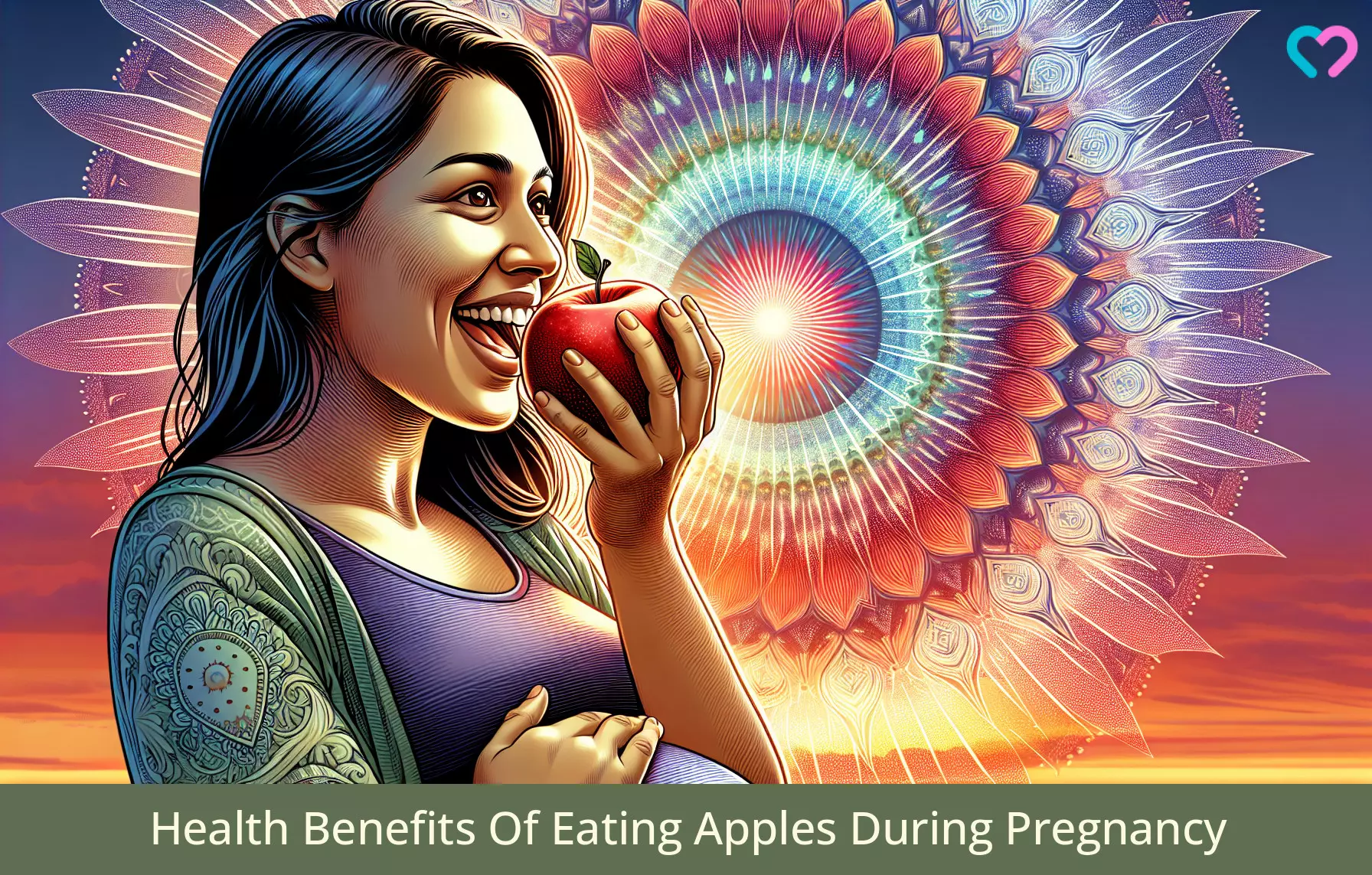
Image: Dall·E/MomJunction Design Team
Personal Experience: Source
MomJunction articles include first-hand experiences to provide you with better insights through real-life narratives. Here are the sources of personal accounts referenced in this article.
i. Then and now: pregnancy III edition;https://www.blogger.com/blogin.g?blogspotURL=https://www.blogger.com/blogin.g?blogspotURL=https://www.blogger.com/blogin?u=https://www.blogger.com/blogin?u=https://bythebrooke.blogspot.com/2014/02/&type=blog&type=blog
References
- Jane Dimer; Food Choices During Pregnancy; Kaiser Permanente (2014)
- Diana Lutz; Washington University in St. Louis (2010)
- Foods Rich In Iron; Grove Medical
- Apples, raw, with skin (Includes foods for USDA’s Food Distribution Program); US FDA
- C. Y. Lee & N. L. Smith; Apples: An Important Source of Antioxidants in the American Diet;New York State Horticultural Society (2000)
- Boosting Your Energy: How To Jump-Start Your Natural Energy And Fight Fatigue; Harvard University (2016)
- Apples; Nutrition Live (2012)
- Apples; The President and Fellows of Harvard College (2018)
- S M Willers et al.;Maternal food consumption during pregnancy and asthma,respiratory and atopic symptoms in 5‐year‐old children; Thorax (2007)
- Morning Sickness; Cleveland Clinic
- Gi Ni Tan et al.; (2021);Rating of four different foods in women with hyperemesis gravidarum: a randomised controlled trial;NCBI
- Apples; Harvard School of Public Health
- Apples, raw, with skin (Includes foods for USDA’s Food Distribution Program).
- Baby Granny Smith Apples; Wyoming Department of Education
- H. Darlene Martin; G92-1088 Pregnancy and Lactation; University of Nebraska – Lincoln (1992)
- Kelly Wolfe et al. (2003); Antioxidant activity of apple peels.
- Toxoplasma ; Food Safety for Moms to Be.
- About Toxoplasmosis; CDC
- Alexandra Scrable (2016); What You Should Expect To Eat When You Are Expecting; Academia
- An apple a day keeps the wheeze away (2007); NCBI
- Liwei Chen et al.;(2012);Prepregnancy Consumption of Fruits and Fruit Juices and the Risk of Gestational Diabetes Mellitus;NCBI
- Are Red Apples Sweeter Than Green Apples?; ERIC
Community Experiences
Join the conversation and become a part of our nurturing community! Share your stories, experiences, and insights to connect with fellow parents.
Read full bio of Shivani Sikri
- Mary Sabat is certified in personal training by the American Council of Exercise (ACE) and has 30 years experience as a fitness trainer, diet planner, and holistic health coach. She did her BS in Dietetics and Nutrition at University of Delaware and MS in Human Nutrition with an emphasis on Exercise Science, at Rutger’s University.
 Mary Sabat is certified in personal training by the American Council of Exercise (ACE) and has 30 years experience as a fitness trainer, diet planner, and holistic health coach. She did her BS in Dietetics and Nutrition at University of Delaware and MS in Human Nutrition with an emphasis on Exercise Science, at Rutger’s University.
Mary Sabat is certified in personal training by the American Council of Exercise (ACE) and has 30 years experience as a fitness trainer, diet planner, and holistic health coach. She did her BS in Dietetics and Nutrition at University of Delaware and MS in Human Nutrition with an emphasis on Exercise Science, at Rutger’s University.
Read full bio of Swati Patwal
Read full bio of Rebecca Malachi
Read full bio of Aneesha Amonz










